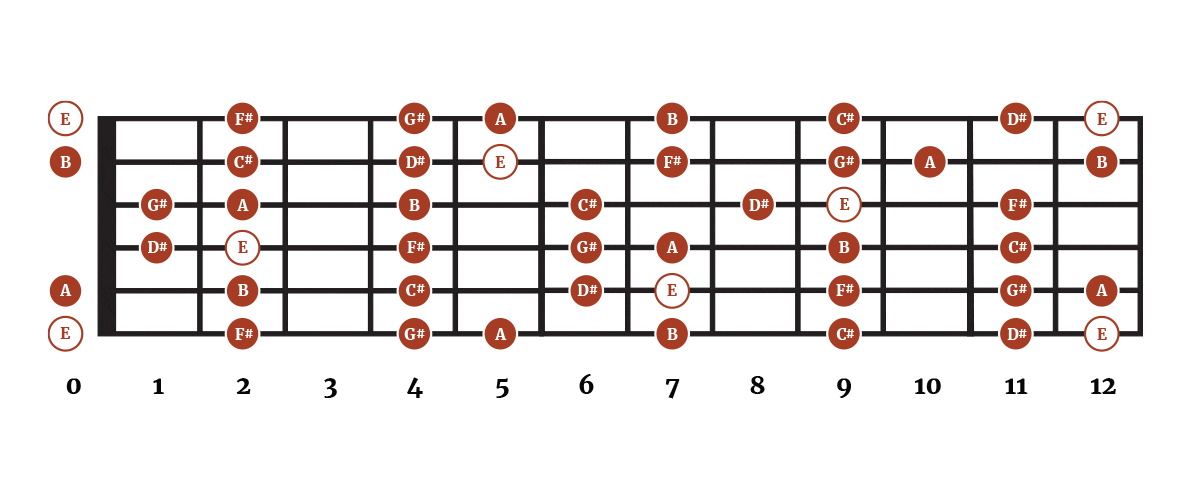What Is Guitar Theory?
At its heart music is the combination of melody, harmony, and rhythm. Music theory is the language used by musicians to understand and communicate these three concepts. Guitar theory is simply music theory applied to the guitar.
What does Guitar Theory Include?

Melody (the arrangement of single notes), in the context of guitar theory, centers around learning the chromatic scale and individual notes of the guitar fretboard, which are made up of natural notes (A, B, C, D, E, F, and G) and accidentals (flats and sharps) which occur between each note except B and C and E and F. Sharps and Flats, for example, C♯ and D♭ and of the same note value, despite being notated differently. When accidentals are of the same note value in this way they are referred to as enharmonic equivalents.
Melody also includes the study of scales, including the major scale and minor scale, minor pentatonic and blues scales (to name just a few), along with scale degree patterns and the intervals that give scales their unique flavor.
If discussing harmony (playing more than one note at a time) we’re mostly focused on guitar chords, basic chord structure and chord theory including major and minor chords, augmented, diminished, sus chords, 7th and extended chord construction, root notes, chord shapes, and chord voicings including basic barre and open chord voicings.
When it comes to rhythm we are solely focused on timing.
Is Guitar Theory important?
The Benefits of Guitar Theory
Learning theory on guitar will help you understand why some melodic and/or harmonic ideas sound wrong in different musical contexts and why some sound right, instead of relying solely on your ears and/or guessing.
You will learn how to construct unique chord voicings and be able to make sense of how they are built, and apply the use of scales without relying on remembering shapes (chord charts) and patterns.
While learning guitar theory is not essential for the beginner guitarist, it is the language of music on the guitar and an incredibly useful tool when it comes to communicating with other musicians (not just guitar players), learning songs, improvising, and composing your own music.
For example, knowing the basics of guitar theory will help you learn songs faster, through anticipation as you will understand the foundations the song is built upon.
When improvising, knowing the rules and when to follow them (and when to break them), will help you better utilize the fretboard while staying ‘in key’, and express musical ideas you may have otherwise not considered.
It’s also incredibly useful for songwriting, helping you build a large pallet to select from and make more informed choices to help express your musical ideas more creatively.
FAQ
Is Music Theory For Guitar Different To Standard Music Theory?
The basic concepts of music theory are the same, however, how these concepts are then applied to the guitar differ greatly from the piano for example due to how the interfaces of both instruments are laid out.
How Do I Practice Guitar Theory?
Practicing guitar theory is part of understanding the way the language of music is put together and how this applies to the guitar, and part muscle memory. Once you understand the concepts involved and develop a practice routine that incorporates practicing scales, chord composition, and improvisation you will begin to see absorb many of these concepts and begin to develop the ‘music memory’ required to properly utilize guitar theory.
What Guitar Theory Should I Learn First?
It’s best to start by learning the notes of the fretboard as this will allow you to more easily navigate the fretboard when learning more advanced concepts. You can read my article here on how to get started with guitar theory.
How Do You Read Guitar Tab?
Guitar tab is designed to be intuitive for guitarists, utilizing six lines representing the guitar’s strings and numbers indicating the individual frets. You can read more about how to read guitar tab here, along with how to read chord charts here.
What Are Modes?
Modes are scales built from other scales. For example, the 7 modes built from the Major scale (Ionian, Dorian, Phrygian, Lydian, Mixolydian, Aeolian, and Locrian) are all derived from different scale degrees of the major scale. Like all scales, modes have their own unique sound based on the intervals used to construct them.
How hard is guitar theory?
Like most things, it really depends on how far you want to take it. If you simply want to understand how to play in key and/or how basic chords are constructed from scales it’s not complicated. If you want to become a ‘music theory expert’ you can study more advanced concepts, ultimately taking things as far as you like.
Summary
In short, I recommend everyone who plays an instrument try to learn the language of music and instead of simply focussing on being a ‘guitarist’ learn how to become a ‘musician’. You can read our free information on guitar theory by following the links above.



